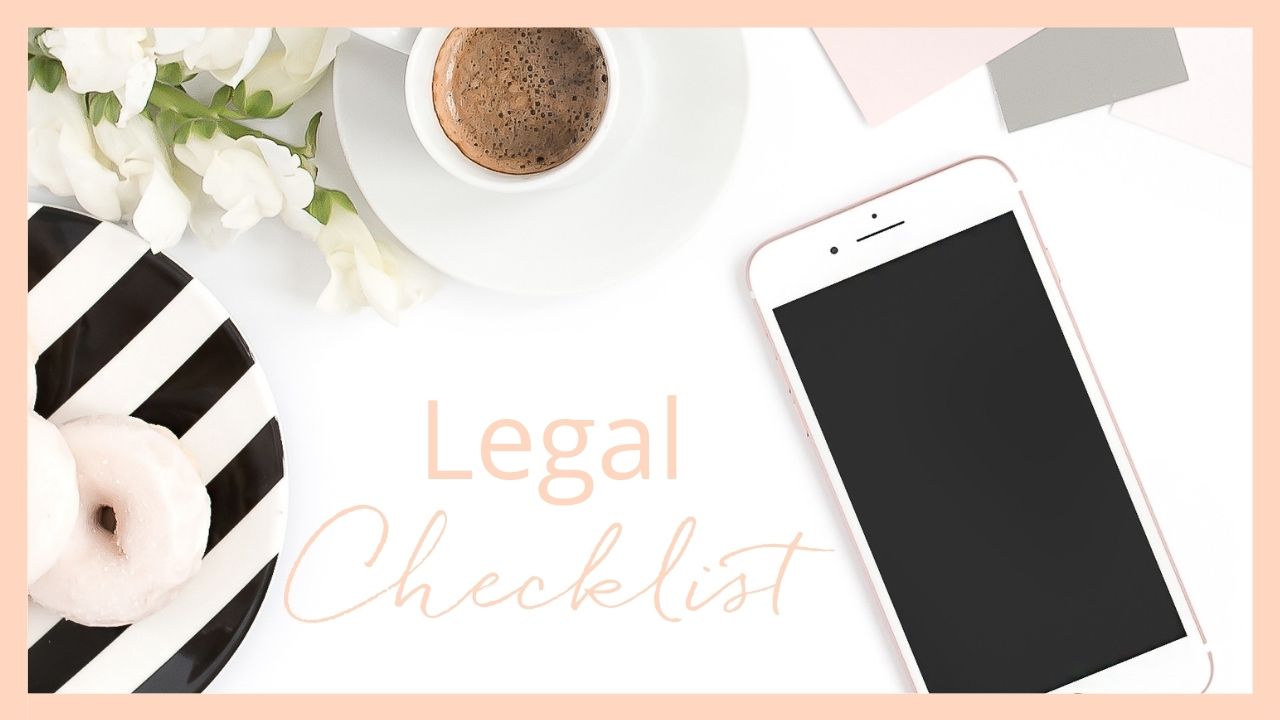There is one word in the world of online entrepreneurship that everyone understands, feels, experiences, and knows. A word that elicits stress, joy, financial success, disappointment, and everything in between: the LAUNCH.
Launches are a very important business model for many online business owners. It is a time when teams are built, experts are hired, strategies are analyzed, funnels are tweaked, and everyone is on high alert looking at the numbers. But there’s one piece of the launch strategy that is constantly overlooked, forgotten, and overall bombed: the LEGAL strategy.
…Is that even a thing?
…Is there a legal strategy to launching?
YES.
And depending on what you are launching, and the way in which you are selling it / taking payment, there is a HUGE amount of legal liability coming your way with each click…
…each purchase,
…each new customer.
But all is not lost. Because although the thought of adding ANOTHER thing to your to-do list during a launch, the truth is…it’s actually pretty easy to be compliant.
There aren’t a lot of complicated strategies. No analysis. No numbers. Just a few good ole’ fashioned legal documents, drafted for your type of business, and tailored to the program you’re launching.
If you commit to getting this part right, I challenge you to complete the project in one afternoon, beginning to end. That’s it! And once it’s done for one launch, it will be very similar for every future launch, with only slight tweaks to each document.
Totally doable!!
Okay so let’s get down to the nitty gritty of what you actually need. I’m all about making the legal piece UNcomplicated. No legal jargon. No confusion. You with me?
HOW TO LAUNCH LEGALLY:
1. Sales Language
Typically, most launch periods begin with a LOT of content strategy and creation. You want to clearly get across the problem you solve, hit the pain points, and highlight exactly what your ideal client will gain from purchasing your program or service. The main things to avoid here?
a. Guarantees
A LOT of coaches and consultants in the online space love to guarantee big transformations, mindset shifts, life changes, and mental breakthroughs. While I absolutely do not doubt those results are possible, and maybe even probable in some cases, from a legal standpoint, you do NOT want to “guarantee” these results. Why? Because you don’t have control over the customer. You don’t know their situation, their life story, their capacity to work through your program, or how well your program is a fit for their needs. Guaranteeing a result puts a lot of pressure on you and the program, and gives them an easy leg to stand on to point out a shortcoming in the services, if they did not experience the results promised.
So how do you fix this? Instead of focusing on on guaranteeing results, focus on the program itself, and what you CAN guarantee. For example, you can guarantee that they will have access to the trainings. They will have the opportunity to learn about the subject you’re teaching on. They will have access to ALL the teachings, guides, and information you used to achieve a certain transformation. YOU have control over what YOU provide to them, which is what you can guarantee. Do THIS, rather than guaranteeing results, or other things that depend on THEIR efforts and situations.
b. Unrealistic Testimonials
If the majority of your previous clients tend to achieve a certain result, while a select few experience outrageously amazing results, it’s extremely tempting to use those outrageously amazing results as testimonials, and to highlight those experiences as what’s possible in the course. HOWEVER, when advertising your program and highlighting testimonials, it is VERY important that you maintain what’s called “truth in advertisement” according to the FTC. In a nutshell, you must highlight the “typical” results, rather than the atypical, and if you do highlight the atypical results, it must include a disclaimer that those results are not typical. We all remember the infomercials about weight loss that show testimonials, along with the disclaimer right below it that the results were not typical. While you may not be selling a weight loss or wellness program, any sort of atypical result includes the same requirement in order to be compliant with FTC regulations.
2. Privacy Policy
At some point during the launch process, you will begin collecting personal information from people, including names, email addresses, billing information, and payment information. Before you do ANY of this — you MUST have a privacy policy on your website, AND on the landing page where customers enter their personal information. This is typically the landing page where you have opened a waitlist for interested customers to sign up, as well as the sales page. Your privacy policy NEEDS to be linked in the footer of EACH of these pages. Data privacy is HUGE right now, and the FTC is cracking down harder and harder on those who are not compliant. As an online business owner, so much of what you do is dependent upon your email list, and launching a program to them is no different. So BEFORE you open your waitlist or your cart for a launch, make sure you have your privacy policy in place.
GRAB YOURS HERE.
3. Earnings Disclaimer
Depending on the type of program you’re launching, another big part of your marketing strategy may be to highlight previous clients’ financial wins, and hint at the amount of money new clients or customers may be able to make by purchasing and using your program. While most people assume it’s common knowledge that certain levels of income cannot be guaranteed, and you certainly cannot know for certain how much money they will or can make from your program, if any. In order to be sure you are legally protecting your business and reducing liability in your launch, I highly recommend having an earnings disclaimer in the footer of your sales page, so all potential customers can easily see it. With this in place, you are compliant with FTC regulations, and you also reduce the likelihood of a customer claiming you guaranteed they would make a certain amount of money from the program.
4. Program Terms of Use
Once your clients reach the point where they know they’d like to purchase your program, you need a contract in place, that each client will be able to read and agree to BEFORE they purchase your program. In a launch-style model, you are likely not speaking 1:1 with each person interested in your program, and are allowing customers to decide for themselves whether the program is right for them, and allowing them to purchase straight away from the sales page.
The legal problem with this model, is that it stops being feasible to have each of these customers receive, review, and sign a client agreement. There are just too many of them, and they are purchasing before you have any access to them.
…But that doesn’t change the legal necessity of having a client agreement in place with each of these people. It actually makes it MORE important, since you aren’t able to properly vet everyone and clarify who the program may actually be a good fit for, versus not.
So what do you do?
You have a document called TERMS OF USE. This is different from your website terms and conditions – it is a client agreement without a signature page. An agreement that your customers will agree to by checking a box on your checkout page, that confirms they have read, understand, and agree to the terms in the Terms of Use. You will link your “Terms of Use” document to the text by the checkbox, and allow customers to click on the Terms of Use, open and review it, then come back to the sales page and confirm their agreement.
THIS IS A HUGE STEP. DO NOT MISS THIS STEP.
Having no Terms of Use in place when you sell an online program is like driving without car insurance. It’s all fun and games until you get pulled over, or until you have a dissatisfied customer, a customer reselling your program, or otherwise acting illegally with your materials. THIS is the document you will refer to in all customer disputes. The one judges / mediators will look at to rule in a claim, should it get to that point. The one you and your team can refer to and direct customers to if they have any questions or complaints about the program.
Depending on the type of program you are launching, what you need in your Terms of Use will vary slightly. Make sure you check out my BEGINNERS’ BUNDLES and choose the one that is right for your business. The Terms of Use is included as one of the 6 documents in here, along with the privacy policy, disclaimer, and more!
When the doors close on your launch and you’re looking at the finished product, you do NOT want to realize none of the legal pieces were in place. Leaving the door wide open for customers or clients to place liability on you/your business, or violating FTC regulations and exposing yourself to fines is not the kind of post-launch stress anyone signs up for. And I don’t want that for you!
Check out my BEGINNERS’ LEGAL BUNDLE HERE, to grab the top 6 templates you need for your upcoming launch.
Grab my FREE Legal Checklist to see if Your Business is Legally Compliant!
*Disclaimer: While I am a licensed attorney, I am not your attorney, and this does not constitute legal advice. This blog post is intended as legal information only, which may or may not be applicable to your personal situation. Please consult an attorney if you need legal advice on any of the above, or have any specific questions regarding your business


